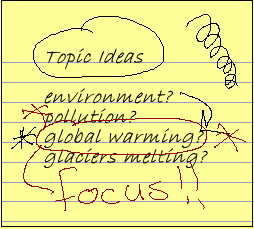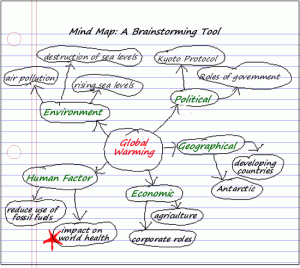5 How Can I Develop a Research Question?
What is exploratory research?
Exploratory research starts with a question. But it’s not just any question. Exploratory research uses high quality sources to answer a narrow, focused research question. This type of writing is objective, meaning that the author does not take sides. These types of papers are common in college courses. You may write an exploratory research essay in a first-year composition course, but the skills you learn will transfer to much longer research papers in your major, then perhaps on to a master’s thesis and a doctoral dissertation.
The purpose of exploratory research writing is to inform the reader, and generally, your audience will be an academic one.
How Do I Choose a Topic?
In some courses, your instructor may assign you a topic or a range of topics that you can choose from. But in many other courses, including this one, you may have an open topic assignment. Choosing a narrowed, focused topic for your research question will be important to your success. Start by using exploring strategies (brainstorm, cluster, list, freewrite, question) about topics that interest you. The topic should be something that you care about because you will be spending quite a bit of time on it in the next few weeks.
After you’ve generated several possible broader topics, you’ll need to narrow and focus one of your topics. One way to narrow your topic is to do a little background research on the Internet. What sorts of questions have others asked about your topic? Are there any new angles that you can explore? While you should not cite Wikipedia as a source in an academic paper, it can be a great place to do some background research to help you narrow and focus your topic.
This brief video provide a quick guide to the process of developing a narrowed, focused research question that is appropriate for an academic audience:
“Developing a Research Question” by Steely Library NKU is licensed under a Creative Commons Attribution-NonCommercial 4.0 International
As we see, developing the research question is one of the most important and challenging parts of exploratory research.
The video gives us some examples of common problems with research questions:
- Too narrow: When was the Civil War?
- Too broad: Why was the Civil War important?
- Too vague: Is television a bad influence? (on whom? What types of programs? What do you mean by “bad”?)
- A question that can’t be answered by academic research: What happens when we die?
After you’ve decided on a topic idea, you can follow the steps below to narrow and focus our topic and develop an effective research question.
You Try It!
How can you use generative artificial intelligence to help you narrow and focus your research question? Try this prompt with any generative AI tool such as Microsoft Copilot, ChatGPT, or Google Gemini:
I am writing a paper on _________________. I need to come up with a narrow and focused research question appropriate for a 6-8 page college exploratory research paper. You are an expert in this field. Please suggest at least five possible research questions that I could explore for my paper. For each question, give me the following information: 1. Background information I will need in order to successfully write on this topic. 2. Suggestions for how to locate high-quality sources on this topic, including key terms I can use to search. 3. Any controversies associated with this topic.
Save the results of your chatbot interaction. Choose one or two questions that are most interesting to you. Remember that the paper should have a personal connection. For example, you can write about a topic in your community, or something in your major, or an issue that affects you personally in some way.
Note: All prompts in the “You Try It” sections are licensed CC0. You may use these prompts without attribution.
Once you have chosen the research question you would like to work with, review the material below, which goes over some best practices for starting your research.
Step One: Do Some Background Research
Collecting a little background information on your topic idea can to help you define and focus your interest into an appropriate topic for an exploratory research essay. You can also find out if your topic is something you want to spend some time with, and if it’s something you can research.
- Jot down a few keywords (terms) related to your topic, then perform some basic searches. Some excellent ideas for collecting background information include the following:
- Scan a few articles in a reliable subject-area or specialized encyclopedias, or online databases the provide REFERENCE overviews.(Like Opposing Viewpoints, CQ Researcher, and Points of View Reference Center). You will find these in the library and online through your library’s web site.
- Try out your keywords in a search engine, such as Google, but don’t go too deep. Remember, you’re just getting a feel for your topic, not doing the research.
- In doing your preliminary research, if you discover that this topic has possibilities, take the time to add additional words to your keyword list.
Collecting background information is not the same as conducting research. At this point you’re just getting a general “feel” for your topic. An hour spent on this step may save you countless hours later.
Step Two: Focus Your Topic
Once you have a topic that you like, you’ll probably need to focus it or narrow it down. Most students start out with topics that are much too broad for their assignments. If your topic is too broad, your research will be much more difficult, and you’ll waste time looking for information that you won’t use.
For example, if you try searching for information on global warming, you will quickly be overwhelmed. Global warming is a large subject, covering a variety of disciplines, topics and issues. How can you narrow this topic?
Brainstorm again.
Jot down all the ideas and questions you might already have about the topic:
- What do you know about global warming? What don’t you know?
- Is there a geographical area you want to focus on?
- Are there individuals or organizations involved in this issue?
- What are some areas impacted by global warming?
- Environmental
- Political
- Economic
- Human element.
It may help to set up a table or chart moving from the general topic to narrower topics:
Brainstorming a Topic
| Topic | Narrower Topic | Even Narrower |
| Global Warming | » Environment | » rising sea levels » destruction of rain forests » air pollution |
| » Political | » Kyoto Protocol » roles of government |
|
| » Human Element | » impact on world health » reducing use of fossil fuel |
|
| » Economic | » agriculture » role of corporations |
|
| » Geographical | » developing countries | |
| » Antarctic region |
If the chart is too formal for you, you might like making a mindmap or concept map. A whiteboard or a big piece of paper are all you need to make a mindmap. Here’s the same information as above, but in a mindmap:

The secret to mindmapping is to free yourself from rules. Don’t worry about grammar, spelling, or formatting. Just jot down ideas until you can’t think of anymore, then go back and make connections between the ideas. If an idea appeals to you, make it the center idea on a new piece of paper and brainstorm more details.
Step Three: Turn Your Topic Into a Research Question
Dig into your topic to find the question
Once you’ve narrowed your topic to something workable, you need to restate it as a question. A question requires an answer, and research is all about the search for answers.
Here’s an example:
Broad Topic: global warming
Focused Topic: global warming and world health
Possible Research Questions:
- How will changes in the world climate increase health risks for people worldwide?
- What should the U.S. government do to prepare for an increase in climate-related diseases?
- What is the role of the World Health Organization in response to increasing diseases?
Once you have a research question, break it into even smaller questions:
How will changes in the world climate increase health risks for people worldwide?
- What climate changes are expected?
- What diseases are most sensitive to climate change?
- What areas of the world are most at risk?
- What statistics are there to prove that health risks are increasing?
- … etc.
You can see that research is basically a quest to find answers to the questions you are asking.
Stop and Reflect
Now reflect on this step of your writing process. Do you personally enjoy this step of the writing process? If so, what do you like about it? If not, what challenges did you face? Now think about how using a generative artificial intelligence tool affected your process in narrowing and focusing your research question. Do you feel that this type of use can benefit you now and in the future? Why or why not? Do you think that using a generative AI tool at the preliminary stages of the research process is more helpful or harmful to your overall thinking and development as a student? How might you use these skills in your future career?
Research Question Checklist
These questions will help you to make sure you’ve developed an appropriate research question for your exploratory research essay.
- Does the question deal with a topic that is personally connected to me in some way?
- Can the research question be answered easily through research?
- Is the scope of this question something that can be answered in a relatively short 1500-2500 word essay?
- What kinds of information do I need to answer my question? For example, if I decide to research the effects of smartphone use on Millennial romantic relationships, I might need the following types of information:
-
- Statistics on Millennial smartphone use
- Statistics on Millennial romantic relationships
- Anecdotal evidence (stories about Millennial smartphone use)
- What sources will have the type of information that I need to answer the research question (journals, books, Internet resources, government documents, people)?
- How will I access the sources I need?
Once you know the answers to these questions, you probably have developed an appropriate research question for your essay.

